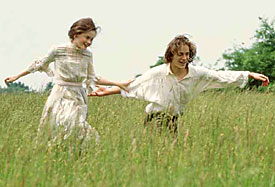 |
|
Photo courtesy of Disney
|
Disney's new movie, "Tuck Everlasting," is a journey into the lives of a family that has found the fountain of youth.
|
|
By Lindsay Utz & Mark Betancourt
Arizona Daily Wildcat
Thursday October 10, 2002
Utz: "Tuck Everlasting" is about a magical spring that, if drunk from, will give you everlasting life. One family has secretly existed for more than a hundred years under the well's spell, until a young girl discovers and befriends them. The movie is based on a "great American novel." I've heard it's a beautiful book, which is not hard to believe after seeing the movie. Since it is often true that the novels are better, it can be safe to presume they have done a wonderful job recreating the magical world that makes this film so beautiful.
Betancourt: Yeah, it's nice.
Utz: Oh no, here we go. Bring on the cynicism!
Betancourt: What? I got nothin' against it. What?
Utz: It's because it's a Disney film isn't it?
Betancourt: Well. Yes, I suppose it is. It's a perfectly nice little story, mind you. For kids. Of course, kids have no idea who Pocahontas was. They don't know that Hercules was burned to death by his wife. Or that Snow White is not sleeping, she's dead, and that's why the prince likes her. The original Grimm's versions were for kids too, you know.
Utz: What does this have to do with anything?
Betancourt: Well, Disney takes stories about life and makes them unconditionally happy. I'm not saying kids need to be hardened or anything like that; the whole point of stories is to flesh out things we can't understand on our own. If there's darkness in the world, or in the past, or in us, then saying so and working through it helps. It helps even kids. In fact, youth might employ the wisdom that old age often squanders.
Utz: Kids will learn soon enough how much darkness there is in our world. Why not let them, and all of us for that matter, escape the darkness that is reality. Let us surrender, Mark, to the magic of the movies. That is exactly what this film does. It reminds us to look around and smell the flowers or pet a fawn or whatever.
Betancourt: Even if the flowers and the fawn will burn or bleed some day, and we can never know them until we embrace that darkness and turn it into poetry? Doesn't that escapist Disneyfication just anaesthetize us? Yes, we've escaped, but to what existence?
Utz: An existence better than our own.
Betancourt: If better is easier. If easier is happier. So while we rot in stagnant prisons of hopeless jobs and wars and the debts of our ancestors, turned again and again into the opiate refuse of ideology, we enjoy the smell of flowers. We grin like idiots in asylums, complacent, invalids of mind and soul.
b>Utz: We're getting off subject · again · like always. So let us speak of this very lovely and very green film. It reminded me of "The Secret Garden" in that we are almost always outside in the middle of the forest, next to running water or looking into the starry night. It is so aesthetically pleasing. The colors, the costumes, the gorgeous and piercing eyes of every main character. And each character was cast wisely, especially Ben Kingsley, who plays so brilliantly the mean guy borderline total psycho, similar to his character in "Sexy Beast." And Sissy Spacek is touching as the gentle mother.
Betancourt: Yeah, it's nice.
Utz: And beyond just the visual strength of the film, it is a great story that is always moving along in some way. We never feel too nauseated by the love scenes because some exciting action scene always follows. We are never bored because there is always some piece of the story we have yet to discover.
Betancourt: I thought the love scenes were great, actually, with or without action following. One in particular in which our young heroine dances to the forest-made drumbeats of her beau, her bare feet turning in the wet earth, her love deep and ancient, primal. It's just a glimpse, though, of those depths. Disney wouldn't, couldn't really take us there. Onward, Pollyanna.
Utz: I agree, it is a dazzling scene.
Betancourt: Yeah, but it isn't what it could be. There's another glimpse of the film's potential depth when a preacher refers to everlasting life as "blasphemy," hinting that the family's immortality violates something sacred, some crucial law of nature and mortality, which makes the human experience so rich. Never mentioned again. Don't get me wrong, it's all there. But the movie just scratches at the surface, it digs up just enough real content to move the story along, but too little to take it anywhere important.
Utz: I disagree. This movie doesn't just scratch the surface, but instead takes a plunge into the real depths of the immortality issue. It makes us think about whether or not we would want to live forever. It makes us dream of endless life, but at the same time question those dreams. Is what we dream of what we really want?
Betancourt: Does it show us that or only pose the question? I mean, you're right, I have to admit the movie does its job because it does deal with the issues at hand, and proposes a resolution.
But the narrator of this film is there to tell us exactly what we're supposed to think and feel. It's like they came out and held up a card saying "Immortality? Good or bad? Probably bad." Sure, they deal with the issues. But what's the point?
Utz: To make us think.
Betancourt: To make us think we've thought.

